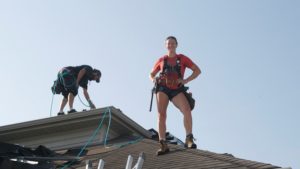So You Want My Job: Roofing entrepreneur
Meg Sim, founder of Meg Sim Roofing, talks about hanging out her shingle, competing in a male-dominated industry and the skilled labour struggle
MEG SIM FOUNDED her business, Meg Sim Roofing, in January, using knowledge she gained a decade earlier working on a roofing crew in Sarnia. Born in Oshawa, she has lived most of her life in London and attended Sir Frederick Banting Secondary School. She has worked as a personal trainer, and she spent two years in Sarnia and three years in Fort McMurray, before returning to London six years ago.
Her partner in life is Jordan Bartol; she is the sole owner of the business. Sim, 32, has a dog named Ollie and a cat named Bunny. She enjoys gardening and is keen to book a trail running trip when travel opens up more.
Click here to read this story in magazine format
Congratulations on establishing your business. The transition from personal trainer to roofing is not an obvious one. How did that happen?
When the pandemic started in March 2020, I had been working as a full-time personal trainer and part-time as a server. Restaurants and gyms closed on the same day, so I lost both jobs at once. At the start of the pandemic a few people called me for repairs, since they knew I used to roof on a crew in Sarnia when I was 21. I loved that job and always told people about it, so friends started calling. I started doing small roofing jobs on my own, getting jobs purely by word of mouth, and then Meg Sim Roofing was created.
Story Continues Below
Starting a business amid a pandemic might not be ideal, but I suppose roofing was not as restricted as the fitness sector?
Yes, the fitness industry was hit hard, and I didn’t see a way out of that situation that I would be happy doing. Roofing, and home improvement in general, spiked during this pandemic and it isn’t slowing down. People spending more time at home really made them see the improvements they needed to make.
The home construction and renovation industries have been plagued by supply shortages during the pandemic. Have you had difficulty getting materials?
Shingles were not hard to get, but metal for fascia and flashing was a bit harder to get at times. For the most part, I did not struggle in this regard. What I have struggled with is finding people. I have found an amazing crew and I am constantly looking for more, but that’s been harder work than I expected, and I think the pandemic has a lot to do with that.

Many people rely on referrals when hiring roofers. What have you done to break into the market?
The gym I worked at before as a full-time trainer had 800-plus members. I did a mobility series for multiple weeks where I put out a 60-second mobility tip video every Tuesday. I gained a lot of followers from that series and used that following to draw attention to my new business and started posting everything I was up to.
Do you take pride being a woman in a male-dominated industry? Or do you wish we were past pointing that out?
I do. I take great pride in that. I hope more and more women join me in this industry. And by the way, I’m hiring!
Story Continues Below
Assuming you have a typical day on the job, what does it look like?
There is no typical day. Each day can vary quite a bit depending on the job and the weather. For a typical London house, my crew and I arrive early, and we start with a five to 10-minute warm-up. I lead the warm-up myself to make sure everyone is ready to be on a roof and lift heavy things. Once the blood is flowing, I go over the plan and goals for the day. Everybody gets a clear job and a timeline and then we get to it.
If there’s no rain in the forecast, we work away and take breaks at natural stopping points in the job. We come off the roof as little as possible, but there’s no shade on a roof so I have to make sure my crew don’t get burned out.
We usually stop working after eight to 10 hours, but as a team we sometimes decide to put in a long day if it means the crew gets some extra rest the next day. A lot of this depends on the weather.
What has surprised you in year one of your business?
I am not surprised by anything because I knew this first year would be scary, and I knew it would really challenge me. And it has! That being said, it has also been very rewarding. I look forward to my continued personal and professional growth. ![]() Interview by Christopher Clark
Interview by Christopher Clark

